Essential Guide to Parrot Nutrition for Optimal Health

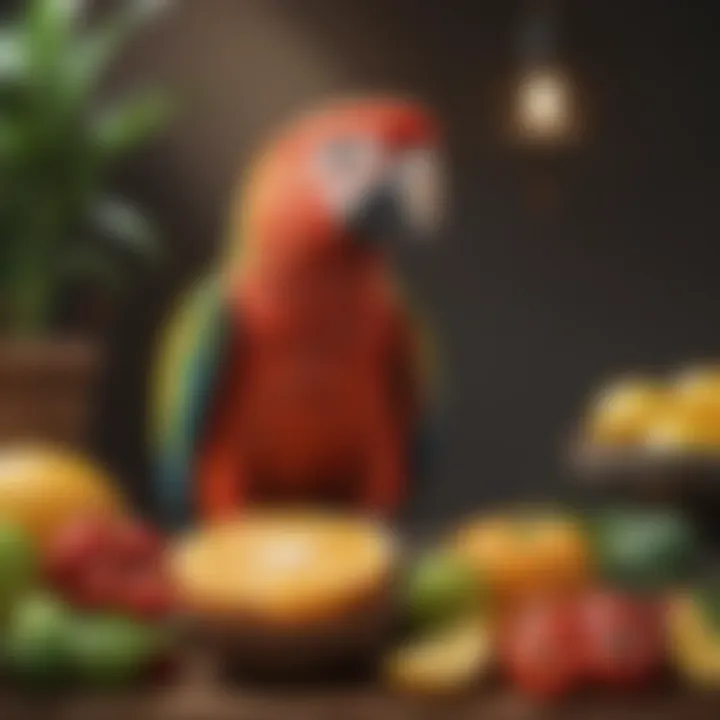
Intro
Parrots are often considered vibrant, intelligent companions, bringing a splash of color and cheer into our lives. But did you know that their health heavily depends on their diet? Understanding parrot nutrition isn’t just a matter of picking up seed mix from your local pet store. It’s about crafting a balanced, diverse diet that caters to the unique needs of each individual bird species. This guide aims to illuminate the pathways to better nutritional choices for your feathered friends while avoiding common pitfalls that could lead to health issues.
Avian Care Basics
Importance of Proper Nutrition
Proper nutrition is the bedrock of avian health. Just as humans thrive on varied diets, so too do parrots. The right balance of vitamins, minerals, proteins, and fats fuels their vibrant plumage and active lifestyles. Neglecting their nutritional needs can lead to a host of problems ranging from feather plucking to chronic health conditions, such as liver issues.
Understanding Bird Species and Their Needs
Every parrot species has its own dietary preferences and requirements. For example, a Macaw needs more fat in its diet compared to a smaller species like a Lovebird. While some parrots love seeds, others thrive on fresh vegetables and pellets. Learning about your bird's specific nutritional needs is crucial. Below is a brief overview of popular parrot species and their dietary preferences:
- African Grey: Tends to require high-quality pellets, fresh fruits, and plenty of vegetables.
- Amazon Parrots: Can benefit from more fat, meaning seeds can be included but should still limit the portion.
- Budgerigar: Need fewer seeds and more greens to maintain good health.
Basics of Birds Habitat Setup
Creating an optimal habitat for parrots goes hand-in-hand with nutrition. A clean, safe environment enhances their overall well-being and can even inspire better eating habits. Be sure to include space for foraging and play, as parrots generally enjoy exploring their surroundings. Clear any leftover food regularly to avoid attracting pests and ensure your bird is engaging actively with its environment.
Grooming and Hygiene Tips
Grooming is more than just a beauty regimen for your parrot; it also plays a role in their health. Regular baths—either in a shallow dish of water or misting—help keep their feathers clean and in good shape. In addition, watch for nail growth, as overgrown nails can cause discomfort and issues with mobility. A well-groomed parrot tends to feel better, which can translate into a brighter mood and, ultimately, better appetite.
"A balanced diet is crucial, but never overlook the importance of cleanliness and a safe environment."
End
Navigating the world of parrot nutrition can feel overwhelming at first. However, by understanding what your specific parrot needs—from proper habitat setups to basic grooming—you'll be on the right track to ensuring they lead a fulfilling, healthy life. This is merely a precursor to deeper explorations into parrot health and happiness, where we will dive further into dietary components and the emotional aspects of caring for these intelligent creatures. Stay tuned!
Understanding Parrot Nutrition
Understanding parrot nutrition is crucial because it sets the foundation for the overall well-being and vitality of these vibrant creatures. Proper nutrition can greatly influence a parrot's lifespan, mood, and ability to engage with its environment. Knowledge about the correct balance of dietary components helps bird owners to make informed decisions that can directly enhance their pet's health.
For a parrot to thrive, it is not just about filling a bowl with food. It requires a thoughtful approach that considers various factors like age, species, and even activity levels. The right mix can bolster a parrot's immune system, promote feather health, and ensure optimal digestion. For instance, a well-rounded diet can prevent common health issues related to obesity and malnutrition, ensuring your avian companion is lively and playful.
The Role of Nutrition
Nutrition plays an indispensable role in the life of a parrot, much like oil keeps an engine running smoothly. It feeds not only their physical needs but also their behavioral and psychological wellness. Parrots are intelligent and social animals; they benefit greatly from a varied diet that mimics their natural foraging behaviors. Such diversity in food helps stimulate their minds and enriches their overall quality of life.
Basic Nutritional Components
Carbohydrates
Carbohydrates are the body’s main source of energy, and for parrots, they are especially vital during their active hours of play and exploration. Many fruits and vegetables serve as excellent carbohydrate sources, providing not just energy but also hydration. A standout characteristic of carbohydrates is their digestibility, which is beneficial given that parrots can sometimes be prone to digestive issues.
On the downside, not all carbohydrates are created equal. Over-reliance on high-sugar foods can lead to health problems, so it’s critical to balance them with other nutrients. Therefore, moderation is key to maintaining a healthy diet.
Proteins
Proteins are another cornerstone of parrot nutrition, acting as the building blocks for tissues, enzymes, and hormones. They are critical for growth, especially in young and developing birds. Foods like legumes, nuts, and certain seeds offer protein richness that helps with muscle development and feather growth. The unique feature of protein-rich diets is they also support better overall vitality and energy levels, enabling parrots to be active and engaged.
However, too much protein can lead to kidney issues in the long run, which makes it important to balance their intake with other components in their diet. The quality and source of protein are just as significant as the quantity.
Fats
Fats are not often emphasized in parrot diets, but they serve as a crucial source of energy, aiding in the absorption of fat-soluble vitamins as well. Nuts and seeds are typical fat sources for these birds. A prime benefit of fats is their ability to sustain energy over longer periods, which is important for less active days or during molting.
Yet, moderation comes into play here again; excessive fat intake can lead to obesity and related ailments. Thus, it's essential to offer high-quality sources while keeping the quantity in check.
Vitamins and Minerals
Vitamins and minerals are vital for the myriad biochemical processes that help keep a parrot functioning optimally. For instance, calcium is essential for bone health and eggshell formation, while Vitamin A is crucial for skin and feather health. Regularly incorporating fresh produce can naturally enhance a parrot’s vitamin and mineral intake.
Each vitamin and mineral serves a particular role; a deficiency or surplus can lead to severe health issues down the line. It's wise to educate oneself on which foods serve specific nutritional needs so that owners can offer targeted support to their pets when necessary.
A well-rounded diet filled with varied nutritional components is the backbone of a parrot's health, paving the way for a vibrant, active, and long life.
Types of Foods for Parrots
Understanding the types of foods available for parrots can make a world of difference in their well-being. It’s not just about fillers on the plate; it’s about providing balanced nutrition tailored to each bird’s specific needs. Selecting the right combination of foods ensures pet parrots are lively, healthy, and thriving. Moreover, as bird owners, knowing what these types of foods entail can help in fostering a harmonious eating habit that goes beyond just survival.
Pelleted Diets
Pelleted diets are often regarded as the cornerstone of a parrot's nutritional intake. These diets are specially formulated, blending all the necessary vitamins and minerals into a single, convenient food type. They come in various sizes and flavors to appeal to different parrot species. What makes pellets stand out is their ability to eliminate the guesswork surrounding what a parrot should eat. The right balance is crucial since these formulated diets are designed to reduce the risk of malnutrition.
But it’s not take-it-or-leave-it; integrating pellets with other foods can prevent dietary monotony. Be mindful that some birds may initially resist pellets, especially if they are used to a seed-based diet. Gradually introducing them and mixing with a slice of fresh fruit or a sprinkle of seeds can ease the transition.
"Variety isn’t just the spice of life; in a parrot’s diet, it's the crucial element for sustaining vitality and preventing boredom."
Seeds and Grains
Seeds and grains have long been a popular choice among parrot owners. However, it's essential to approach these options with caution. While seeds are a natural part of a parrot's diet, an over-reliance can lead to health issues. They tend to be high in fat and low in essential vitamins and minerals. For example, sunflower seeds, while tasty for many birds, often become candy to them—delicious but not necessarily nutritious.
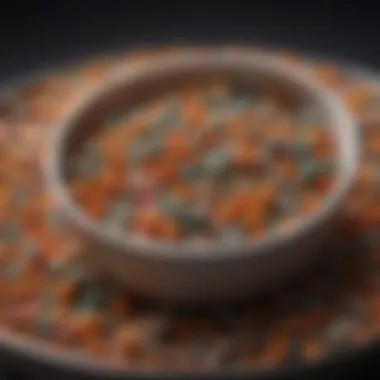
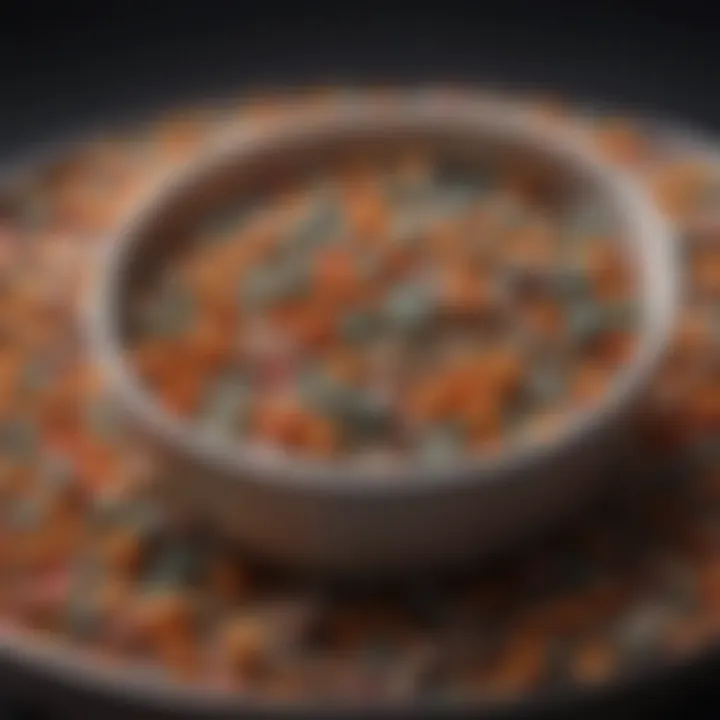
Incorporating seeds and grains can add texture and enjoyment to a parrot's meal. Many birds enjoy foraging, and scattering seeds can mimic their natural behaviors. It’s worth remembering that moderation is key. Mixing seeds with pellets or fresh produce can enhance the overall nutritional value while allowing parrots to enjoy their favorite munchies.
Fresh Fruits and Vegetables
Fresh fruits and vegetables should become a staple of any parrot's dietary regimen. These foods are packed with nutrients and antioxidants, which boost overall health. The vibrant colors of fruits and veggies like carrots, leafy greens, apples, and blueberries not only attract a parrot’s attention but also offer an array of health benefits.
Including a slice of fruit or a handful of veggies daily can provide essential vitamins that pellets and seeds may lack. It's best to experiment as different parrots often have quirky taste preferences. For instance, some might take to crunchy greens easily, while others may lean more towards sweet fruits. The key is offering a variety and ensuring that a fresh selection is always at hand.
Maintaining a well-rounded diet with a mix of pellets, seeds, and fresh produce not only keeps your feathered friend healthy but also creates a fulfilling mealtime experience for them.
Special Dietary Needs by Species
Understanding that different parrot species have distinct dietary requirements is key to ensuring their health and well-being. Just like humans, each bird species has its unique characteristics, which affect how they metabolize food. If owners neglect these differences, they risk inadequate nutrition, leading to health challenges down the road. Tailoring a parrot's diet according to their species results in enhanced vitality, better behavior, and a longer lifespan. Therefore, recognizing and addressing the special dietary needs of each species lays a strong foundation for their overall health.
African Grey Parrots
African Grey parrots are highly intelligent and sensitive birds. Their nutritional needs are quite specific mainly because they thrive on diets rich in fresh fruits and vegetables. These birds benefit greatly from a higher proportion of vitamins and minerals due to their active brain functions.
They require a varied diet consisting of:
- Fruits: Apples, bananas, and pears packed with essential vitamins.
- Vegetables: Leafy greens like kale and spinach which are rich in nutrients.
- Pellets: High-quality pellets should form a major part of their diet.
Additionally, African Greys have a tendency to develop obesity if their calorie intake isn’t monitored. Therefore, it’s prudent to limit high-fat seeds and nuts while keeping their diet interesting by rotating their food options regularly.
A varied diet can lead to improved mental stimulation—essential for the intelligent African Grey.
Macaws
Macaws possess powerful beaks and a need for a diet that supports their size and activity level. Known for their colorful feathers and boisterous personalities, these birds thrive on a mix of hard and soft foods.
A well-rounded macaw diet should include:
- Nuts: Almonds, walnuts, and pecans in moderation for healthy fats.
- Fruits: Pineapple, mango, and papaya provide natural sugars and hydration.
- Vegetables: Bell peppers and carrots rich in beta-carotene help with their overall health.
Remember that macaws can be prone to certain kidney issues if they consume too many foods high in oxalates, like spinach. It’s best to limit these and choose foods that promote kidney health to avoid potential complications.
Cockatoos
Cockatoos are known for their affectionate nature and unique crests. Their diet consists mainly of seeds; however, they need a diverse range of textures and flavors to maintain interest and health.
Key foods for cockatoos include:
- Pellets: These should make up about 60% of their diet.
- Fruits and Vegetables: Sweet potatoes, apples, and green beans are excellent choices.
- Nuts: Treat them with nuts to promote bonding but ensure they are unsalted and given in moderation.
Since cockatoos can be prone to feather plucking and other stress-related issues, maintaining dietary balance is crucial. A lack of important nutrients can exacerbate their stress levels, so be mindful to consult with a veterinarian specializing in avian diets.
Budgerigars
Budgerigars, commonly known as budgies, are small, sociable birds that can adapt well to a variety of feeds. Despite their small size, they also have specific nutritional needs. Their diet should mainly consist of:
- Seeds: A good budgie seed mix which includes millet and canary seed.
- Grains: Cooked quinoa and rice can be interesting and healthy additions.
- Fruits and Vegetables: Include broccoli, carrots, and occasional pieces of fruit like berries.
Budgies can fall into the trap of getting used to seed-only diets. This approach may lead to vitamin deficiencies and obesity. Offer enriched pellets and ensure you introduce fresh foods to create a balanced diet, which would not only keep them healthy but also engaged in their feeding behavior.
Essential Elements of a Balanced Diet
A well-rounded diet is vital for parrots, reflecting not just their health but also their overall happiness and longevity. Parrots are intelligent creatures, and their dietary needs are as diverse as their personalities. Providing a balanced diet means understanding the essential components that contribute to their vibrant life. Each food option offers its unique set of nutrients, and how these are combined can significantly affect your bird's well-being.
Ratio of Seeds to Pellets
Seeds have long been thought of as the staple of a parrot's diet. While they do provide some essential nutrients, they often come with unnecessary fats and, when overfed, can lead to obesity and health issues. The inclusion of pellets is critical for a parrot’s nutritional success. A better approach is a ratio that prioritizes pellets to seeds—about 70% pellets to 30% seeds.
This shift towards pellets ensures that the parrot is receiving a more comprehensive range of vitamins and minerals. Pellets are typically fortified with essential nutrients, including calcium, which is crucial for strong bones. However, when transitioning from a seed-heavy diet to a pellet-based one, it’s wise to go slowly. Sudden dietary changes can cause digestive upset, which is last thing you need.
Incorporating Fresh Produce
Every parrot owner will tell you: fresh fruits and vegetables are the jewels of your bird's diet. Not only do these foods provide hydration, but they also come loaded with vitamins that are key for health. Leafy greens like kale, spinach, and romaine are fantastic choices. Brightly colored vegetables such as peppers and carrots also bring a variety of phytonutrients that can boost immunity.
Don't forget about fruits; consider using apples, bananas, or blueberries—but always wash them well to remove any pesticides. Just remember, moderation is crucial. Too much fruit can lead to sugar overload, resulting in health problems down the line.
"A balanced diet is like a well-written song; every note matters, and harmony is key."
Appropriate Treats
Treats are an excellent way to bond with your parrot, but choosing the right ones is important. Instead of reaching for commercially produced snacks, consider healthier alternatives like nuts, whole grain bread, or a small amount of cooked grains like quinoa or brown rice. These can be given sparingly, ensuring your parrot isn’t just treated but also nourished.
Avoid treats high in sugar or artificial ingredients. It's tempting to shower your feathered friend with goodies they much enjoy, but this could lead to overweight birds who lack energy and vitality. Agreement is to treat wisely—focus on things that also add nutritional value.
By blending the right balance of pellets, fresh produce, and appropriate treats, parrot owners can create a lively, dynamic diet filled with various flavors, textures, and colors that appeal to their pet birds. Considering these essential elements ensures that your parrot leads a healthy, fulfilling life.
Hydration and Its Importance
When it comes to the well-being of parrots, hydration is often overshadowed by aspects like diet composition and ingredient quality. However, the role of hydration in maintaining the health of these vibrant birds is not to be taken lightly. Just like humans, parrots require water for nearly every physiological process, and ensuring they stay hydrated is crucial to their overall health.
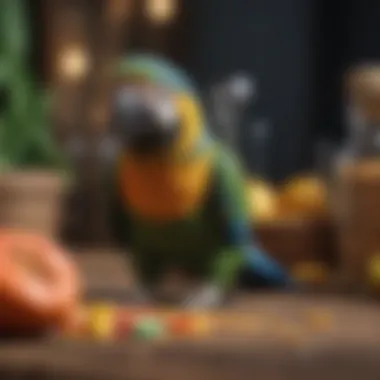
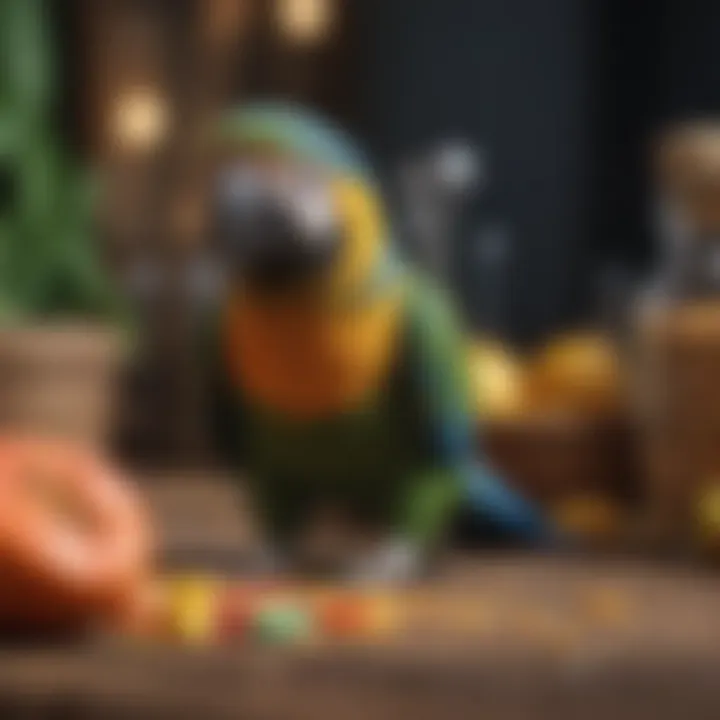
Water aids in digestion, nutrient absorption, and temperature regulation. It also plays a vital role in keeping their feathers healthy and their skin hydrated. Water intake can impact a parrot’s mood, energy levels, and even its learning abilities! If you want your feathered friend to strut about with energy and good health, understanding and managing hydration should be at the top of your list.
Water Quality
It's not just about giving your parrot water; the quality of that water matters immensely. Parrots have sensitive systems, and contaminants in water can quickly become a health risk. Tap water may contain chlorine, heavy metals, or bacteria — none of which are beneficial for your bird. Opting for filtered or bottled water is a wise choice. Look for water that is free from impurities.
"Clean water is a parrot's best friend."
Signs of Dehydration
Just like they can’t say, "I’m thirsty", parrots can’t precisely communicate their hydration needs. For this reason, as a pet owner, being vigilant about signs of dehydration is paramount. Below are some clues that your parrot might be lacking sufficient water:
- Dull Feather Condition: Healthy feathers are bright and shiny. If your parrot’s feathers look lackluster, dehydration could be a contributing factor.
- Sunken Eyes: An observant eye can spot changes; if your parrot's eyes appear sunken, it may indicate dehydration.
- Less Activity: A parrot that is lethargic may not be getting enough fluids.
- Dry, Cracked Skin: Check areas around the beak and feet for signs of dryness.
It's vital to keep these signs in mind. Addressing dehydration early can make all the difference between a vibrant, lively bird and one that’s struggling. Regular monitoring, alongside providing high-quality water, can help foster a happier and healthier parrot.
Common Nutritional Mistakes
Understanding the dos and don'ts of parrot nutrition is crucial for ensuring the health and longevity of these vibrant birds. Common nutritional mistakes can hinder a parrot's well-being and lead to various health issues. Recognizing these pitfalls allows pet bird owners to create better diets and lifestyle patterns for their feathered friends. This section sheds light on a few prevalent errors that many bird owners make, providing insights into how to correct these missteps and foster a balanced approach to avian nutrition.
Over-reliance on Seeds
Many parrot owners might think that seeds are the best and most natural diet for their feathered companions. While seeds do hold some nutritional value, an over-reliance on them can result in serious health concerns. Most seeds are high in fat but lacking crucial vitamins and minerals, leading to obesity and deficiencies over time.
Consequently, this can cause conditions such as fatty liver disease or even a lack of vital nutrients like calcium, which is essential for bone health. Parrots thrive on a varied diet that includes fresh fruits, vegetables, and pellets designed to meet their specific needs. To avoid this common pitfall:
- Introduce a varied diet: Ensure that the bird has access to a range of foods daily. Fresh produce should always be a staple in their meals.
- Limit seed intake: Instead of feeding seeds as the primary food source, consider them a treat rather than a staple.
Ignoring Nutritional Variability
Each parrot species comes with its own set of nutritional needs. A lack of understanding regarding these distinct requirements often leads to misguided feeding practices. For instance, what works for a cockatoo might not be suitable for an African Grey. Ignoring this variability can easily end in the long-term health issues for specific bird breeds.
By overlooking the diversity in parrot diets, owners might give a "one-size-fits-all" approach that often falls short. This could involve:
- Species-specific diets: Researching and adopting diets that consider your parrot's species-specific needs.
- Adapting the diet over time: As birds age, their nutritional needs also change. Keep an eye on older birds and adapt their daily intake accordingly.
Misinterpretation of Feeding Guidelines
Feeding guidelines can sometimes be ambiguous and lead to confusion among parrot owners. Misinterpretation of these guidelines can mislead owners into providing either too much or too little food. It's vital to focus on quality rather than just quantity.
Some common misinterpretations include:
- Following generic feeding quantities without taking the bird's size, age, and health into account.
- Overestimating the usefulness of supplements without ensuring a balanced base diet.
To better navigate feeding guidelines:
- Consult professionals: Whenever in doubt, reach out to avian veterinarians or certified avian nutritionists. Their insights can safeguard your bird from undue harm.
- Educate yourself: Take the time to read up on reliable resources to better understand your bird's requirements. Engaging in pet bird forums can also yield helpful, real-world advice.
Avoiding these common nutritional mistakes establishes a strong foundation for a happy, healthy parrot. Knowledge and active engagement in your parrot's diet form the cornerstone of responsible ownership.
Supplementing Parrot Diets
Supplementing the diets of parrots can be a game changer for their overall health and well-being. While providing a varied and balanced diet is essential, there are times when additional nutrients can support your parrot’s specific needs. Factors like age, health status, and dietary restrictions can all influence the necessity of dietary supplements. This section explores two of the most crucial types of supplements—vitamins and minerals, as well as probiotics—and the unique benefits they bring.
Vitamins and Minerals
Vitamins and minerals play vital roles in a parrot's health. Unraveling the specifics can feel overwhelming, but understanding their importance is crucial for any bird owner.
- Vitamins: These organic compounds sustain various bodily functions, including metabolism, immune response, and growth. Common vitamins for a parrot include Vitamin A, essential for vision and skin health; Vitamin D3, which aids in calcium absorption; and Vitamin E, important for healthy feathers and muscle function.
- Minerals: They are indispensable for numerous physiological processes. Calcium is often highlighted for its role in bone development and egg-laying. Phosphorus, magnesium, and trace elements like zinc and selenium help maintain regulatory functions and metabolic pathways in parrots.
"An imbalance in vitamins and minerals can lead to deficiencies, which manifest in signs like feather picking or poor feather quality."
When introducing vitamins and minerals, it’s essential to consult with an avian veterinarian. Over-supplementing can lead to toxicity; thus, the right dosage must be tailored to your bird's specific needs.
Probiotics and Other Supplements
Probiotics are live microorganisms that can deliver health benefits. Basically, they are the good guys that support gut health in parrots. This is particularly important since a healthy digestive system can significantly affect nutrient absorption.
- Benefits of Probiotics: They aid in balancing the gut microbiota, improving digestion, enhancing immune response, and even supporting mental health. Stressful situations, such as moving homes or changes in routine, can disturb a parrot's gut flora. Probiotics can help restore balance during these times.
- Other Supplements: Depending on specific needs, you might also consider fatty acid supplements, like Omega-3, beneficial for skin health and reducing inflammation. These supplements can ensure that your feathered friend gets a well-rounded diet.
Incorporating supplements is not just about throwing in a powder or a pill. It involves understanding your parrot's individual requirements and making adjustments based on health observations.
In summary, supplementing your parrot’s diet with the right vitamins, minerals, and probiotics can lead to noticeable differences in their health and vitality. A careful balance is key to preventing both deficiencies and toxicities, ensuring that your parrot thrives.
Monitoring Nutritional Health
When it comes to keeping parrots in tip-top shape, monitoring nutritional health is a foundational piece of the puzzle. This ongoing process is crucial for understanding how well the dietary provisions align with the needs of these vibrant creatures. You see, parrots, like us, thrive on balanced nutrition. But how do you know if your feathery friend is on the right track?
Regular monitoring can illuminate both the successes and the pitfalls in a bird's diet. This involves not just paying attention to the food but also observing changes in the bird's overall health and behavior. Dietary adjustments might be needed along the way, and being proactive in monitoring can help catch potential issues early.
Regular Health Check-ups
Health check-ups are not just for humans; your parrot needs them too. Scheduling regular vet visits ensures that you can catch any signs of nutritional imbalances before they become critical. During these check-ups, the veterinarian can assess your bird’s weight, plumage quality, and overall demeanor. Any drastic changes might signal an underlying issue that needs addressing.
Consider keeping a diet diary where you record what your parrot eats. Some dietary habits might seem innocuous but might lead to health complications down the road. By keeping detailed records, this can facilitate discussions with your vet, highlighting any concerns about the bird’s nutrient intake.
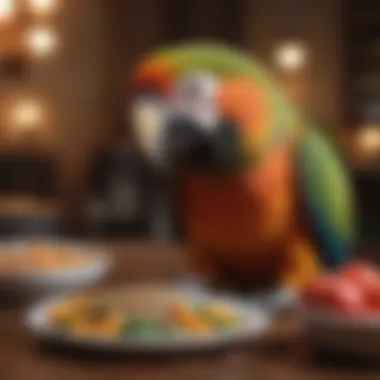
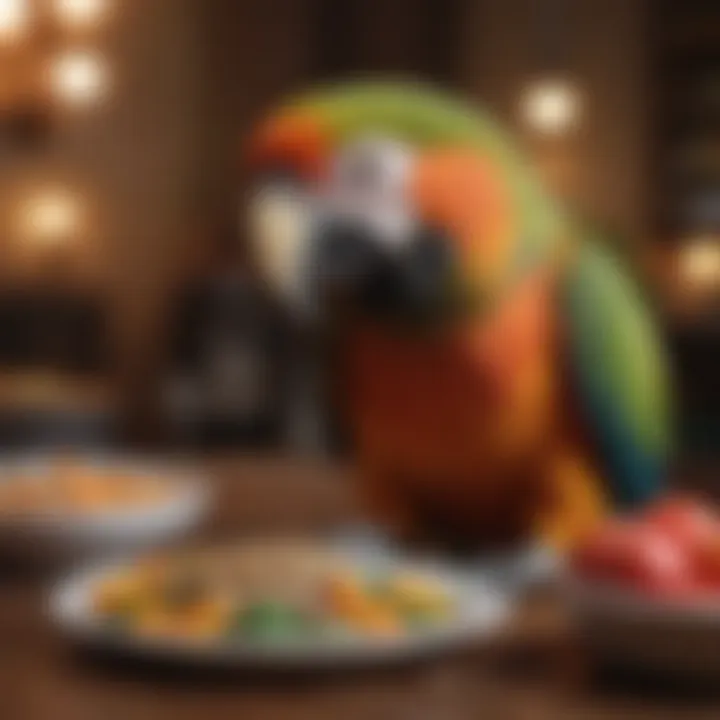
Behavioral Indicators of Diet Quality
Parrots are not exactly shy about expressing their feelings. Their behaviors often provide valuable insights into how well their diet is serving them. For instance, a parrot that is lethargic or overly irritable might be lacking essential nutrients, while a bird displaying unusually vibrant feathers is likely getting a balanced diet.
Here are some behavior cues to watch for:
- Vocalization Changes: A sudden decrease in chatter or mimicry may hint at dietary deficiencies.
- Feather Condition: Dull or brittle feathers can indicate a lack of proper fats or proteins.
- Activity Levels: A parrot that is less active than usual might not be getting enough energy from its food.
The importance of these signs cannot be overstated. By being attuned to your parrot's behavior, you set yourself up to make timely adjustments to their feeding regimen.
"Monitoring dietary habits and behavioral indicators creates a proactive environment for maintaining your parrot's health."
Practical Feeding Tips
When it comes to the health and wellness of parrots, practical feeding tips can't be brushed aside. Establishing a feeding plan isn't just about keeping the bowl filled; it’s a systematic approach to ensure that your feathered friend gets a balanced diet that suits their needs. With the vast array of food options available, navigating through them can seem daunting. However, having a clear strategy is paramount. A well-structured feeding routine not only benefits the parrot's physical health but also enriches their mental well-being. This brings us to our first point: establishing a feeding routine.
Establishing a Feeding Routine
Consistency is key in almost every aspect of life, and feeding parrots is no different. Setting a regular feeding schedule fosters a sense of security in your bird. Here are some insights:
- Feeding Times: It’s beneficial to stick to specific times each day. Parrots thrive on routine, and knowing when their next meal is coming can reduce anxiety. For instance, consider feeding your parrot in the morning and late afternoon. This aligns with their natural instincts and encourages healthier eating habits.
- Portion Control: Measuring portions helps manage weight, which is incredibly important. Overfeeding can lead to obesity and its related health issues. Aim to provide a balanced selection that includes pellets, seeds, and fresh produce, ensuring not to go overboard on high-fat seeds.
- Environment Matters: Place the food dish in a quiet, comfortable area of the cage. This reduces stress and allows for relaxed eating. Birds, much like us, can be sensitive to their environment. If they feel threatened or uncomfortable, their appetite might take a hit.
Tips for Implementing a Routine
- Use Timers: Setting timers can help you stick to feeding times.
- Daily Checks: Always check the food and water before you head out for work or the day.
- Avoid Changes: Try to keep feeding times consistent, even on weekends.
By setting a routine, you’re enabling your parrot to feel settled in their environment while also ensuring they receive the nutrition they need. Now, let’s look at how experimenting with variety can also play a huge role in their diet.
Experimenting with Variety
Variety is more than just the spice of life; for parrots, it's a fundamental part of a healthy diet. Birds are naturally curious and enjoy discovering new tastes and textures. Feeding them a range of foods can help stimulate their senses and encourage healthy eating habits. Here’s how to effectively experiment with variety:
- Explore Fresh Produce: Introduce different fruits and vegetables into their diet. Apples, carrots, and bell peppers are great options, but don’t hesitate to try less common choices like sweet potatoes or kale.
- Rotate Pellets and Seeds: Just like people, birds can get tired of eating the same thing day in and day out. Change the brands of pellets or try different seed mixes occasionally. However, do this gradually to avoid digestive upset.
- Incorporate Sprouted Seeds: For a nutritional boost, consider adding sprouted seeds to their meals. These are often packed with vitamins and can be a delightful new treat for your parrot.
- Monitor Reactions: Keep an eye on how your parrot responds to new foods. If they’re particularly enthusiastic about a certain item, take note of this. On the flip side, if they turn their beak up at something, it might not be a favored choice.
"Birds enjoy varying textures and tastes, so don't hesitate to get creative and expand their menu!"
Not only does introducing variety contribute vitamins and nutrients that may be lacking in a monotonous diet, but it also keeps mealtime exciting for both owner and bird. In the long run, a diverse menu can pave the way for a vibrant, healthier life for your feathered companion.
Tailoring your parrot's diet to include a balanced routine and an engaging range of food can help pave the road for optimal health and happiness.
Case Studies: Successful Nutritional Practices
When it comes to the well-being of our feathered friends, the adage "you are what you eat" rings particularly true, especially for parrots. This section looks at how practical experiences translate into better nutritional practices for our avian companions. By reviewing real-life applications of dietary theories and various feeding strategies, we can gain valuable insights into the substantial benefits of tailored nutritional programs.
Owner Experiences
Many bird owners encounter challenges while striving for the optimal diet for their parrots. Their firsthand experiences can offer invaluable lessons. For instance, a parrot owner named Karen recounted her journey with her African Grey named Coco. Initially, she fed him a diet predominately composed of seeds, thinking it was adequate. Over time, she noticed a change in Coco's energy levels and feather condition, prompting her to seek advice.
After researching and participating in communities focused on avian nutrition, Karen shifted Coco’s diet. She gradually introduced pellets and fresh produce to the mix. The change didn’t happen overnight, but within weeks, Coco showed a marked improvement. His energy returned, and he began to engage more fully with his surroundings, demonstrating that a more balanced diet had a significant impact on his health.
This transition illustrates the importance of proactive learning and adjustments in parrots’ diets. Additionally, many owners on forums like Reddit share similar victories, noting how simple changes can lead to noticeable improvements in their pet’s health.
Nutritional Improvements in Parrots
The benefits of implementing successful nutritional practices are evident in many documented cases. One notable case involves a pet shop that decided to overhaul their feeding protocols. They faced ongoing complaints from customers regarding health issues in parrots sold, prompting an evaluation of their nutritional offerings.
The shop owners introduced a more comprehensive diet plan. They replaced the all-seed mixtures with quality pellets, added a variety of fresh fruits and vegetables, and encouraged customers to experiment with nuts as treats. As a result, they reported fewer health complications, and customers shared happier stories about their healthier birds.
Following this, several owners reported significant changes:
- Improved Feather Condition: Parrots' feathers became shinier and healthier.
- Increased Activity Levels: Birds were observed playing and engaging more actively rather than just sitting.
- Better Social Interactions: Birds that were once shy or reluctant to interact became more outgoing and vocal, suggesting improved overall health due to better nutrition.
In summary, real-world experiences of parrot owners provide concrete evidence that tailored feeding strategies can create positive outcomes in their birds’ health. Not only can a balanced diet alleviate many common health issues in parrots, but it can also enhance their overall quality of life.
"The change in my parrot's behavior was staggering after I introduced a more varied diet. It's like I unlocked a new level of personality!" – Parrot Owner
Both individual stories and collective evidence from case studies speak volumes about the impact of thoughtful nutritional practices on parrot health. Understanding these narratives can empower current and future parrot owners to make informed feeds that promote the well-being of their beloved pets.
Resources for Further Learning
In the journey of ensuring our feathered friends receive the best nutritional care, understanding the available resources is crucial. Knowledge is power, and when it comes to parrot nutrition, having access to quality information can profoundly affect a parrot’s health and well-being. Knowledge not only helps bird owners make informed dietary choices but also keeps them updated on best practices and emerging research. With the right resources, you can navigate the sometimes murky waters of avian nutrition like a seasoned sailor.
Books and Articles
Reading books and articles can provide an extensive foundation in parrot nutrition. Various publications delve into the scientific background of avian dietary needs and offer practical advice. Here are a few recommended readings that pack a punch:
- "The Parrot Problem Solver" by Barbara Heidenreich: This book not only touches on dietary needs but also discusses behavioral aspects that can impact nutrition.
- "The Essential Guide to Feeding Your Parrot" by Dave Holderread: A great resource detailing the specifics on balancing a parrot’s diet.
- Scientific journals: Articles found in journals like the Journal of Avian Medicine and Surgery often present cutting-edge research on parrot health and nutrition. These can offer insights that are not available in general literature.
Notably, merging practical advice with scientific understanding helps create a balanced perspective. It encourages parrot owners to think critically, recognizing that a one-size-fits-all approach rarely works with these diverse and complex creatures.
Online Communities and Forums
The digital age has made it easier than ever to connect with other parrot enthusiasts. Online communities and forums are goldmines for sharing experiences, opinions, and advice on feeding and nutrition. Below are a few platforms where you can learn from others and exchange information:
- Reddit: Subreddits like r/parrots offer lively discussions where members share their insights, tips, and personal experiences regarding parrot care and nutrition.
- Facebook Groups: There are numerous groups dedicated to parrot care where members post about their feeding practices, ask questions, and sometimes even share studies or articles they come across.
- Specialized forums: Websites that focus solely on birds, like BirdBoard or Avian Avenue, can be treasure troves of specialized knowledge from experts and fellow bird owners alike.
Utilizing these online resources not only broadens the knowledge base but encourages community support. People can learn from each other’s successes and mistakes, which is invaluable when navigating the world of parrot care.
"Knowledge is like a garden; if it is not cultivated, it cannot be harvested." - African Proverb
Equipping yourself with the right resources is like having a roadmap in unfamiliar territory. The journey of learning about parrot nutrition is ongoing, and staying engaged with various sources can ensure that you provide the optimal diet for your birds.















